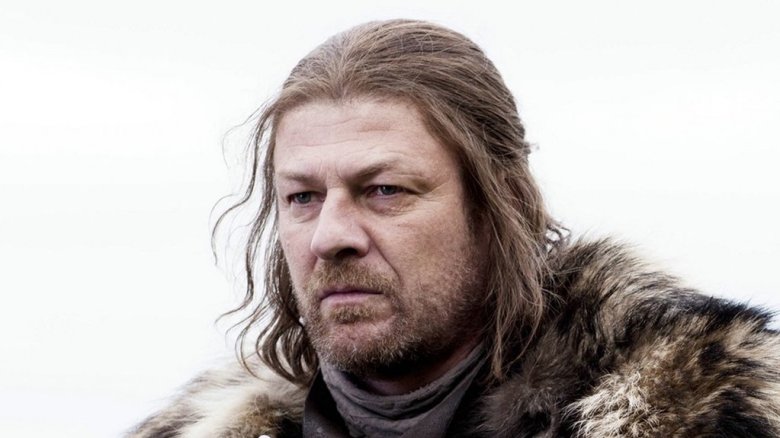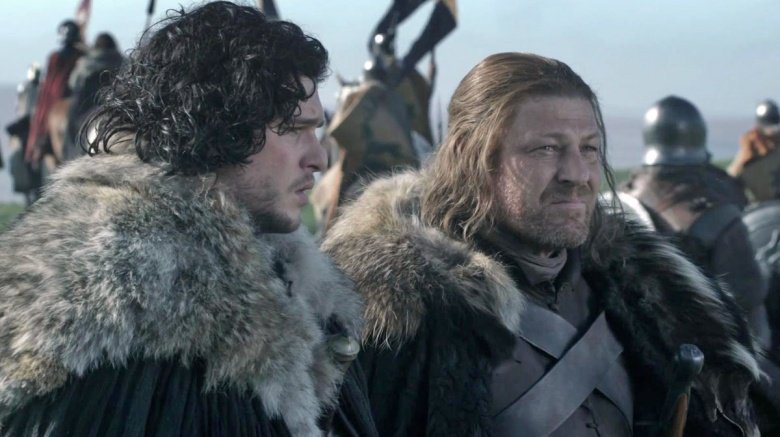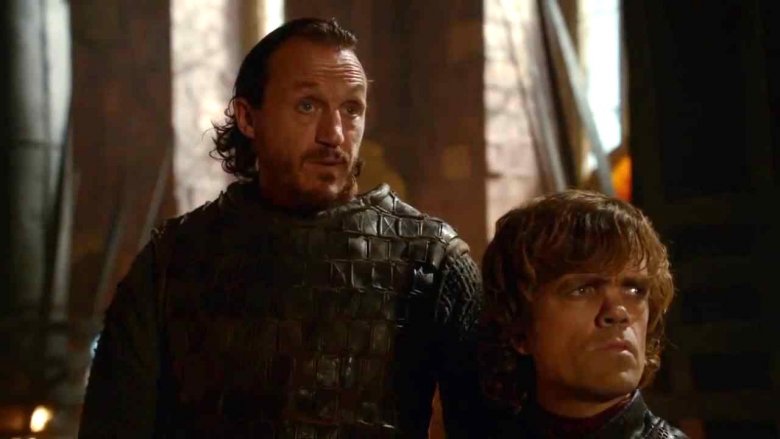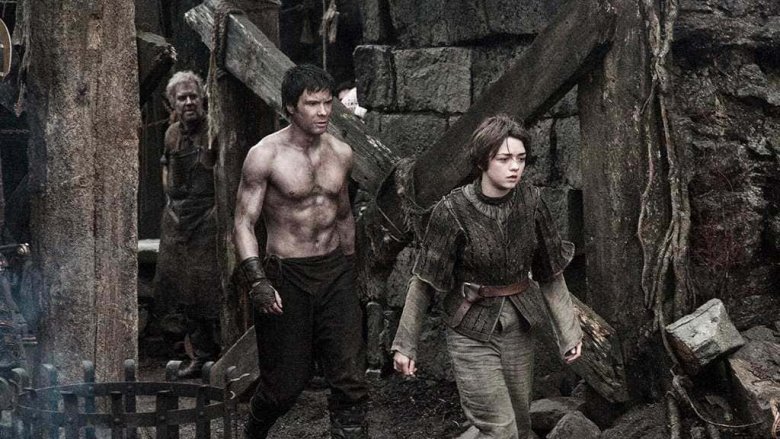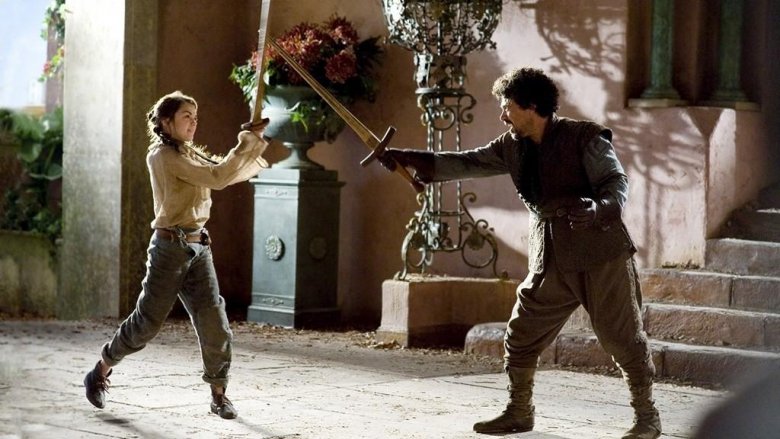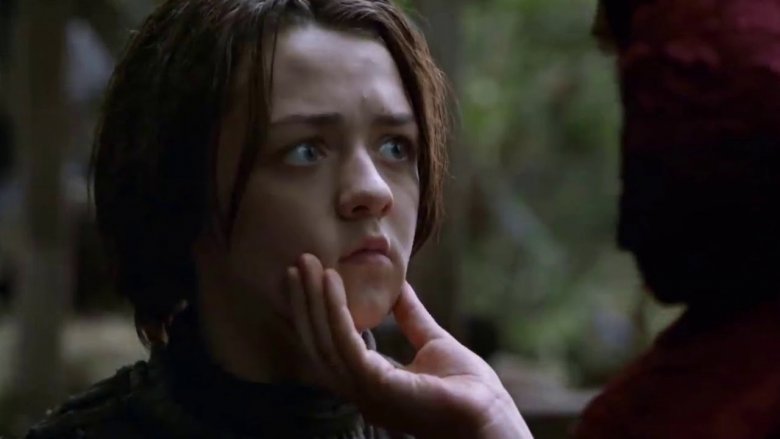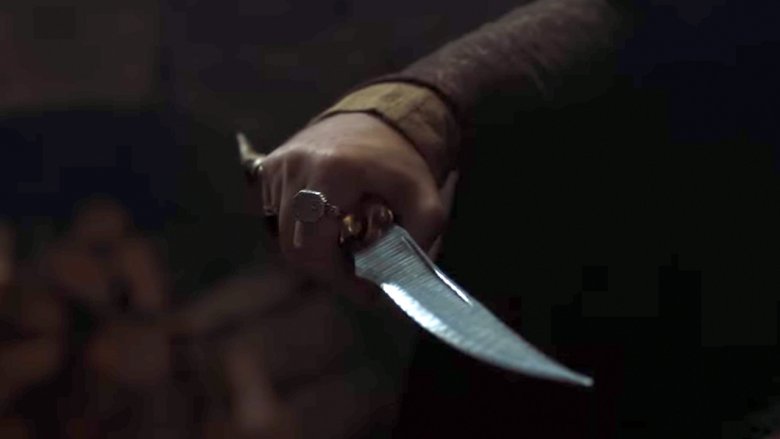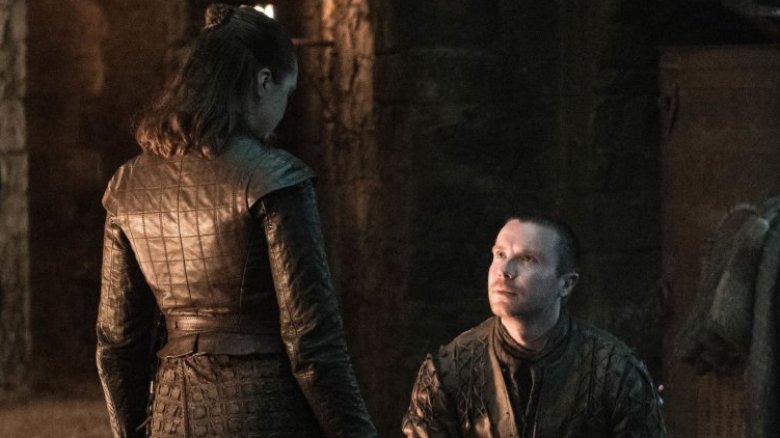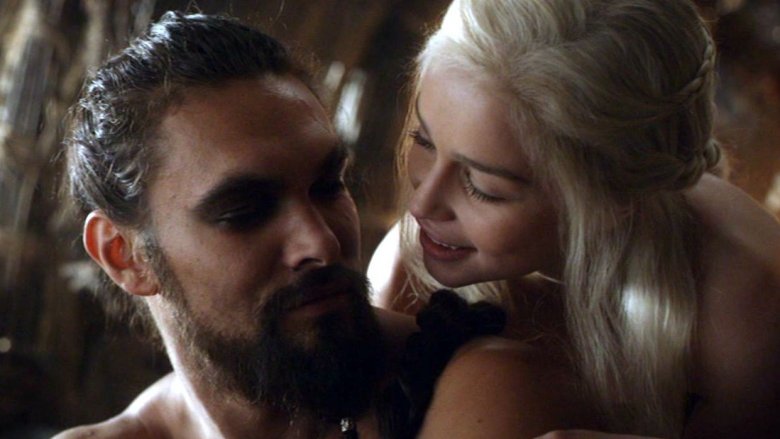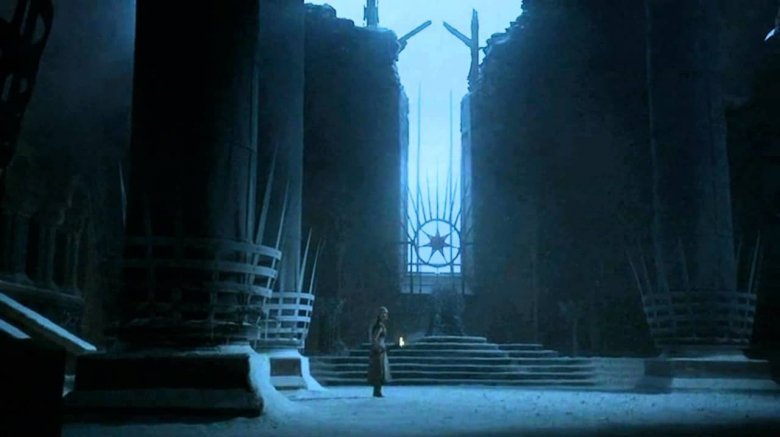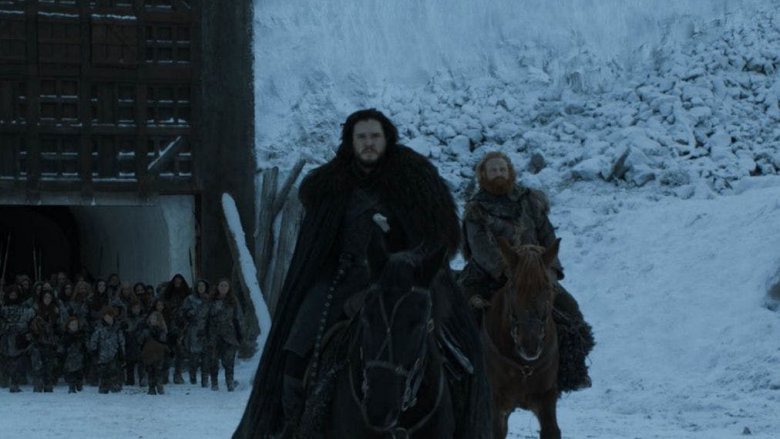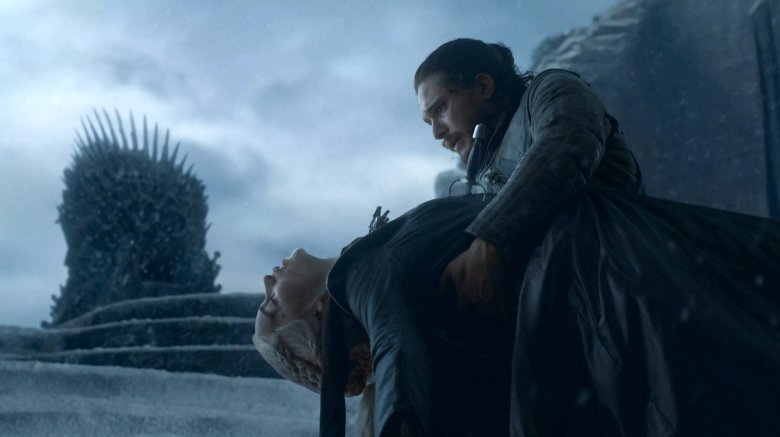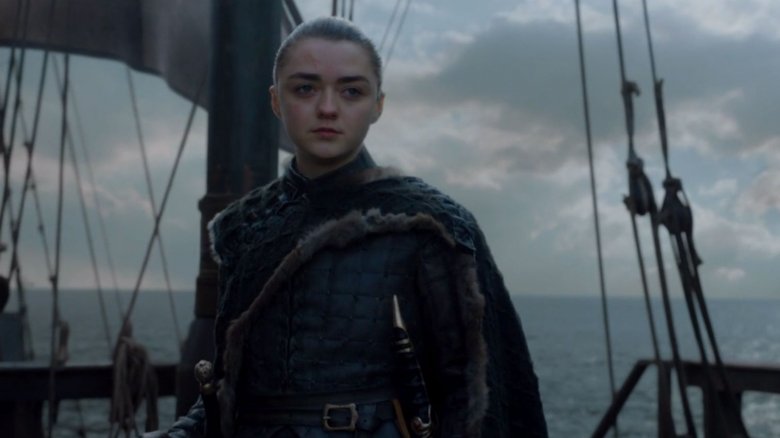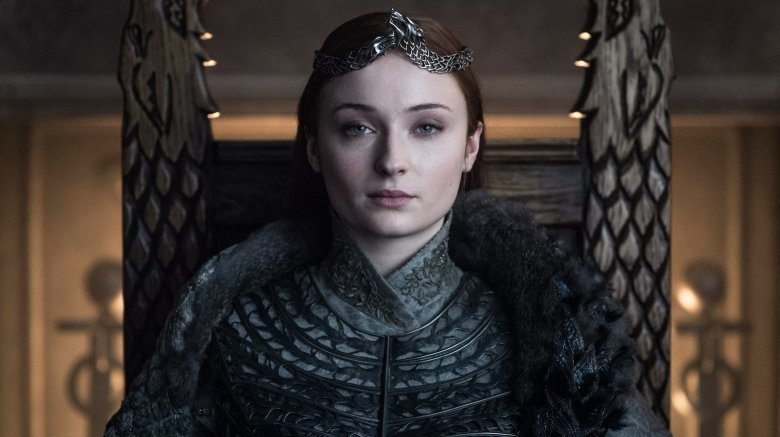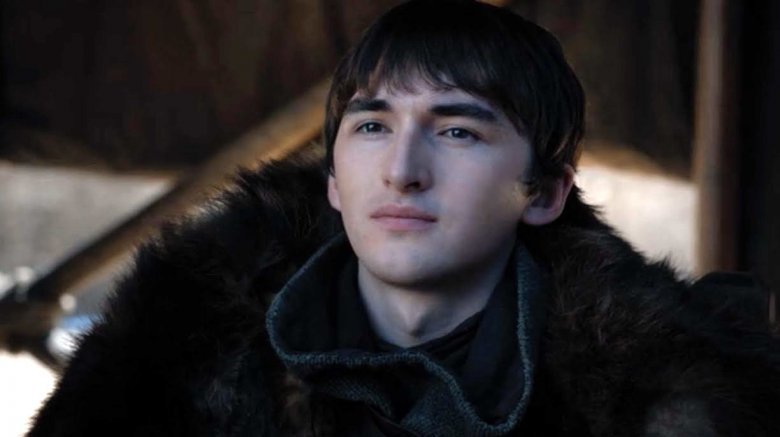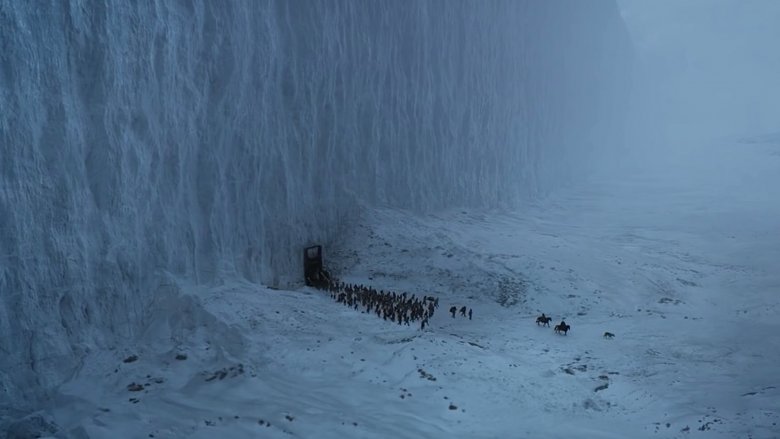Early Game Of Thrones Moments That Foreshadowed Events In The Final Season
Game of Thrones is coming to a close with its eighth and final season, and HBO's massively popular fantasy show is nothing if not chock-full of symbolism, foreshadowing, and callbacks. Based on George R.R. Martin's dense A Song of Ice and Fire novels, the series packs mythology, politics, relationships, sex, family, dragons, and ice zombies into one story — and now that the whole story is concluding, plenty of the tracks laid by showrunners David Benioff and D.B. Weiss are paying off as viewers see who will live, who will die, who will end up together, and of course, who will win the all-important Iron Throne and rule all of Westeros.
Since the eighth season's premiere in April of 2019, fans have been tearing apart the final episodes for callbacks to previous seasons — and there's plenty to see, from meaningful lines to unexpectedly helpful sword fighting techniques and mysterious prophecies. Here are all of the early Game of Thrones moments that foreshadowed events we've already seen in the final season.
Ned Stark's final promise
The last time Jon Snow (Kit Harington) sees Ned Stark, the man he grew up believing was his father, is just before Ned leaves Winterfell for King's Landing and Jon heads north to serve at the Wall. As the two are separating, Ned tells Jon, who he raised as his bastard son, that the next time he sees Jon, he'll tell him the truth about who his mother really was.
Since this is Game of Thrones, there was no next time — Ned got his head chopped off after being accused of treason for (correctly) pointing out that Robert Baratheon's "son" Joffrey wasn't actually heir to the throne, but was the product of adultery and incest. Jon's friend Sam Tarly (Jon Bradley) and Bran Stark (Isaac Hempstead-Wright), one of the brothers Jon was raised with, later discover Jon's true heritage — he is the offspring of Ned's sister Lyanna Stark and Rhaegar Targaryen, an heir to the Iron Throne, who were secretly married prior to their deaths. When Sam shares this long-buried family secret with Jon, he does so right in front of Ned's statue in the Winterfell crypts — keeping Ned's promise after all.
A Lannister always pays his debts
Bronn (Jerome Flyyn), Westeros' most charming sellsword, has always made his way by looking out for himself first, but he's forged a few bonds along the way. Throughout the show, Bronn has frequently paired up with one of the Lannister brothers, and his friendships with Jaime (Nikolaj Coster-Waldau) and Tyrion (Peter Dinklage) have been two bright spots during a frequently dark series. From representing Tyrion in a trial by combat to re-teaching Jaime how to fight after the former champion loses his hand, Bronn's loyalty might lie in his wallet, but that doesn't diminish either of those genuine relationships.
That explains why, when audiences watched as Cersei offered Bronn pretty much any payment he wanted to kill both of her brothers, they were immediately concerned that Bronn's financial greed might overrule his actual affection for the Lannister men. Cersei's hit hasn't yet come to pass — and it still might not, thanks to a crucial Tyrion quip from way back in season 1. After Bronn wins Tyrion's freedom at the Eyrie by serving as his champion, Tyrion tells him, "if the day ever comes when you're tempted to sell me out, remember this: whatever their price, I'll beat it. I like living." Bronn may be bought easily, but that could work to Tyrion's advantage this season.
King Robert Baratheon's prediction came true
As Thrones opens, the Iron Throne is occupied by King Robert Baratheon (Mark Addy); once a great warrior, the kindly but formidable king has grown fat and drunk, relying on his close friends like Ned Stark in moments of weakness and strife. Specifically, Robert reaches out to Ned after his previous Hand of the King, Jon Arryn, is apparently murdered, and asks Ned to come to King's Landing in his stead. (Things don't end particularly well for Ned either.) Before things go downhill for poor noble Ned, Robert comes to see him at Winterfell, and the two head down to the crypts to visit the statue of Lyanna Stark, Robert's lost love, and chat about how they can work together to improve the realm.
For his part, Robert is concerned with their legacies, and he tells Ned that since he has a son and Ned has a daughter, they can join their houses and create a seriously impressive dynasty within Westeros. Years later, Robert's prediction actually comes to pass, but definitely not in the way he meant: on the eve of the Battle of Winterfell, Robert's last remaining bastard, Gendry (Joe Dempsie) and Arya Stark (Maisie Williams) take advantage of the calm before the carnage, joining the Baratheon and Stark houses in a way Robert absolutely never anticipated.
Syrio Forel's lessons proved to be valuable
Arya begins Game of Thrones as nothing more than a spirited pipsqueak with ambitions of becoming a great fighter — ones that begin to be realized when she starts taking lessons from Syrio Forel, the First Sword of Braavos and an incredibly prescient teacher. During his training, Arya starts chasing cats throughout King's Landing, telling Ned that it's an assignment from Syrio so she can learn to be quick and silent. Though Syrio is slaughtered by Meryn Trant and other Knights of the Seven Kingdoms when Ned is imprisoned, Arya doesn't forget Syrio's lessons, especially when she brings those teachings to the House of Black and White in Braavos, where she learns to be a formidable faceless assassin who can take on anyone — even powerful fighters like Brienne of Tarth (Gwendoline Christie).
When Arya finally fulfills her destiny and enters the Godswood to take down the seemingly unbeatable Night King, it's not just a Valyrian steel dagger that propels her to victory — Syrio Forel's lessons about silence and stealth have clearly paid off, since the only sign of her attack is a gentle breeze that blows through another White Walker's hair. More than that, Syrio teaches Arya to fight with both hands, which proves crucial in her one shot to take down the biggest threat to Westeros, letting her flip her knife from one hand to the other and deliver the final blow to the Night King.
Melisandre's prophecy
Melisandre (Carice van Houten), the mysterious Red Priestess who worships the equally mysterious Lord of Light, makes plenty of predictions during her time on Thrones, but not all of them pan out. For several seasons, she's completely convinced that Stannis Baratheon (Stephen Dillane), Robert's brother, would prove victorious and sit on the Iron Throne. She ends up being very wrong about that, but she's also very right sometimes. In season 3, when she meets Arya Stark, she tells Arya that she sees a "darkness" in the young girl, and that the darkness staring back had "Brown eyes, green eyes, blue eyes. Eyes you'll shut forever."
Melisandre assures a young Arya that they're certain to meet again — and meet they do, in a locked room during the massive battle at Winterfell. As the battle rages on, audiences can basically see Arya weighing whether or not to murder Melisandre (a member of her kill list) until the Red Priestess repeats the prophecy, reminding Arya that she can still be the key to winning the entire battle. Throw in a reference to the question Syrio Forel always used to ask Arya — "What do we say to the God of Death?" with Arya replying, "Not today" — and the young warrior is revved up and ready to fulfill her purpose.
Littlefinger's dagger started one war and ended another
Game of Thrones has introduced plenty of important props, and from Jon Snow's Mormont heirloom Longclaw to Brienne and Jaime's matching swords, most of them are deadly weapons. Arya Stark's dagger is no exception: eagle-eyed viewers will remember that this particular blade has been around since the first season, when it was used to try and murder Bran Stark while he was comatose after being pushed out of a high tower window. The dagger's actual owner, Littlefinger (Aidan Gillen), tries to pass off the dagger as belonging to Tyrion Lannister, but eventually, he ends up with it again and gives it back to Bran — who in turn gives it to Arya in the show's seventh season, seemingly for some sort of huge purpose.
When Arya uses the dagger to execute Littlefinger in a public trial, it seems as if the dagger's story is probably over, but that's definitely not true. Since it's made of Valryian steel, one of the few substances that can destroy the Night King, it's one of the only weapons that can threaten the leader of the Army of the Dead — but more importantly, its use in Bran's assassination attempt helped kick off the War of the Five Kings in the first season, and it's only fitting that it ended up ending the Great War.
Arya finally finds herself
Arya's search for her identity has been a huge part of Thrones from the beginning, and as the story's end looms, she's getting closer. Way back in the show's first season, Arya tells her father, Ned, that she has no intention of becoming a lady and taking care of her husband's home, explaining, "That's not me." After a long journey through the halls of the Faceless Men in Braavos, where she eventually resists the pull to give up her identity and become "no one," she echoes that line during an unexpected meeting with her childhood pet, Nymeria. She tells the wolf, "That's not you," which then prompts Nymeria to lead her pack away from Arya rather than attack her.
In the show's eighth season, Arya finds herself the subject of an unexpected proposal after spending one night with Gendry on the eve of battle. The pair survive to see the defeat of the Night King, and Gendry, as a thanks for his role, is legitimized by Queen Daenerys and named Gendry Baratheon, the new Lord of Storm's End. Gendry, clearly head over heels for Arya, asks her to marry him and become the Lady of Storm's End, but once again Arya responds, "That's not me." After eight seasons, Arya still might be figuring out who she is, but she certainly knows who she's not.
Drogo & Daenerys' promises came true
The first season of the show found Daenerys married off to Khal Drogo (future Aquaman star Jason Momoa) in a move orchestrated by her brother Viserys (Harry Lloyd) so the Targaryen family could claim the enormous Dothraki army led by Drogo. Though the two get off to a rough start thanks to language barriers and a truly horrifying wedding night, Daenerys and Drogo eventually fall in love, thanks to her bravery and his willingness to compromise. When she finds out she's pregnant with his child, prophesied as the "Stallion Who Will Mount the World," Drogo promises that he will sail "wooden horses" across the sea to Westeros to give his son the Iron Throne (which he calls the "Iron Chair,"), swearing to rape and pillage the Seven Kingdoms as well as "kill the men in the iron suits and tear down their stone houses."
Seasons later, after Drogo has died and Daenerys has taken control of an entirely new Dothraki army, she makes a similar promise atop her largest dragon, Drogon. It certainly comes to pass, with Daenerys laying waste to King's Landing, tearing down its stone houses, and decimating its population, even after she promised she would allow the city to surrender and show its citizens mercy. At least Drogo would have been proud.
Twin visions
Since season four, Bran has been "training" to become the Three-Eyed Raven, which involves plenty of visions, something akin to time travel, and even manipulation of things to come; during his journey, one of his longest and most jumbled visions offered hints of things to come. Interspersed with shots of the weirwood trees, Bran's own life, and ravens, Bran saw two things that have now come to pass — a dragon's shadow gliding over King's Landing (indicating the city's total destruction), as well as the Throne Room covered in what viewers previously believed was snow, but we all now know is ash.
Bran might currently have a monopoly on the whole "visions of the past, present, and future" thing these days, but he's not the only one who already saw the destruction of King's Landing. At the end of season two, when Daenerys set off on a quest in the foreboding House of the Undying to rescue her two captive dragons, she saw herself in an ash-covered Throne Room (in Bran's vision, the room was empty), but she didn't sit down on the Iron Throne itself, distracted by a different room that held Khal Drogo and her unborn child.
Jon's a true Northerner
Jon Snow is one of the biggest symbols of the North throughout the entire series, from his upbringing at the hand of the Warden of the North to the moment he's literally named, well, King in the North. Despite the fact that he turned out to be half Targaryen and a Southern-born heir to the Iron Throne, Jon never seemed entirely comfortable in the southern parts of Westeros, and at the end of the series, it's possible that he gets his wish after all.
Jon ends up banished to the Night's Watch as punishment for killing the queen, but once he arrives at the Wall, he has a joyful reunion with both Tormund (Kristopher Hivju) and his faithful direwolf, Ghost. It's appropriate that Tormund is the man to greet Jon, considering that Tormund once told Jon he saw the "true North" in him. Between that and Jon's admission back in season 2 that his "father" (well, uncle) Ned Stark told him that he was "of the North," viewers should have known Jon would always end up at the Wall.
Daenerys' fate
Stabbed to death in the throne room by a man who was sworn to protect her but saw the truth about how dangerous she had become, it's easy to see the parallels between Daenerys' death and the way her father Aerys was killed. Even though that was never seen on the show (but spoken of extensively), there was plenty of foreshadowing in previous seasons that indicated how Daenerys might meet her end.
Another Targaryen, Maester Aemon, told Jon back in the show's first season that "love is the death of duty," a saying that Jon repeated to Tyrion as he found himself increasingly convinced that killing Daenerys was the right idea, but Daenerys' vision of the Throne Room came into play once again when it came to her demise. In both her vision and her last moments, Daenerys is distracted before she can take a seat on the throne, and in both, something that could be either snow or ash gently falls from the sky. After the siege on King's Landing, it's now clear that the substance is ash, but in her vision, it also could have signified the arrival of a man named Snow who would be her downfall.
Arya's curiosity
At the end of the series, after being a part of several intense battles and saving humanity by slaying the undead Night King, Arya Stark has certainly earned a vacation, and the last shots of Arya show her sailing away from Westeros, ready to explore the edge of the world and find out what's west of Westeros, where the "maps stop." Nobody knows what's out there (except maybe Bran, her all-seeing, all-knowing brother, but he doesn't bother to fill her in), so Arya, armed with a fleet and Stark banners, sets out to discover a new land once and for all.
Some viewers might have been surprised by Arya's sudden desire to flee Westeros, but this curiosity of Arya's was introduced in the show's sixth season, when Arya makes friends with a local Braavosi actress named Lady Crane. Though the Faceless Men have assigned Arya to kill Lady Crane, she can't bring herself to hurt her, and even goes to her for help after an attack by the Waif. As she tends to Arya's wounds, Lady Crane tells Arya she should join the acting troupe and go to Pentos, but Arya refuses, saying, "Essos is east and Westeros is west. What's west of Westeros?" Arya has been looking forward to exploring the end of the world for years, and now that she's prevented an apocalypse in Westeros, she's finally free to do as she desires.
Sansa says she'll be queen one day
When viewers first met Sansa Stark (Sophie Turner) during season 1, they were mostly exasperated by the whiny, entitled eldest Stark girl who wanted nothing more than to marry Joffrey, have his babies, and most importantly, become the queen, as she tells her mother Catelyn. Watching her father's public execution at the end of that season certainly robbed her of the desire to become Queen of the Seven Kingdoms, and after suffering years of abuse, brutality, and hardship, it seemed that all Sansa really wanted was to live out her life at Winterfell, her family's ancestral home, which she helped win back from the Boltons during the Battle of the Bastards.
After successfully lobbying for the independent North, Sansa does return home as the only Stark at Winterfell, and in the series' closing moments, gratified fans get to see Sansa crowned as the Queen in the North, adorned with a wolf crown and a dress bearing homages to her family and her past. Young Sansa may not have been entirely right, but she did correctly predict she would be a queen someday.
Tyrion's saddle design for Bran
As the series opens, Bran Stark is learning how to shoot an arrow, but by the end of the pilot, it becomes apparent that he won't be studying marksmanship anymore, as he is thrown out of a tall tower after making a disturbing discovery about Queen Cersei and her twin brother's "super close" relationship. Permanently paralyzed, Bran is confined to a wheelchair for the remainder of the series, but right away, he is met with sympathy by one character who proves to be incredibly important in Bran's life.
In an early season one episode, an empathetic Tyrion designs a schematic for a special saddle that would allow Bran to ride a horse again, even without the use of his legs. Tyrion tells Bran's older brother Robb, who is skeptical, that he has a special place in his heart for "cripples, bastards, and broken things," which is why he designed the saddle in the first place. Not only does this foreshadow that Tyrion will eventually help Bran — Tyrion ultimately nominates Bran for the throne and becomes Bran's Hand of the King — his line is also a harbinger of Bran's future royal name, Bran the Broken.
The show begins and ends at the Wall
The very last shot of Game of Thrones depicts Jon, Tormund, and Ghost leading a group of Wildlings away from the wall, with the camera panning out in an epic wide shot as the horns sound and the gates open so Jon and his group can head into the far North. Whether they're headed there because Jon is becoming the King Beyond the Wall or they're simply leading the free folk home is anybody's guess, but this particular shot echoes a familiar one that also kicked off the series.
The (literal) cold open of the Game of Thrones pilot features an unfamiliar group that viewers will soon learn are members of the Night's Watch, setting off beyond the Wall on a rescue mission. The Army of the Dead is still very much in existence at this point, and the group ends up ambushed, leaving only one survivor. Both scenes open with similar shots of the Wall, with the series finale directly echoing the pilot's wide shot, and it feels right that Thrones began and ended right where it started.
